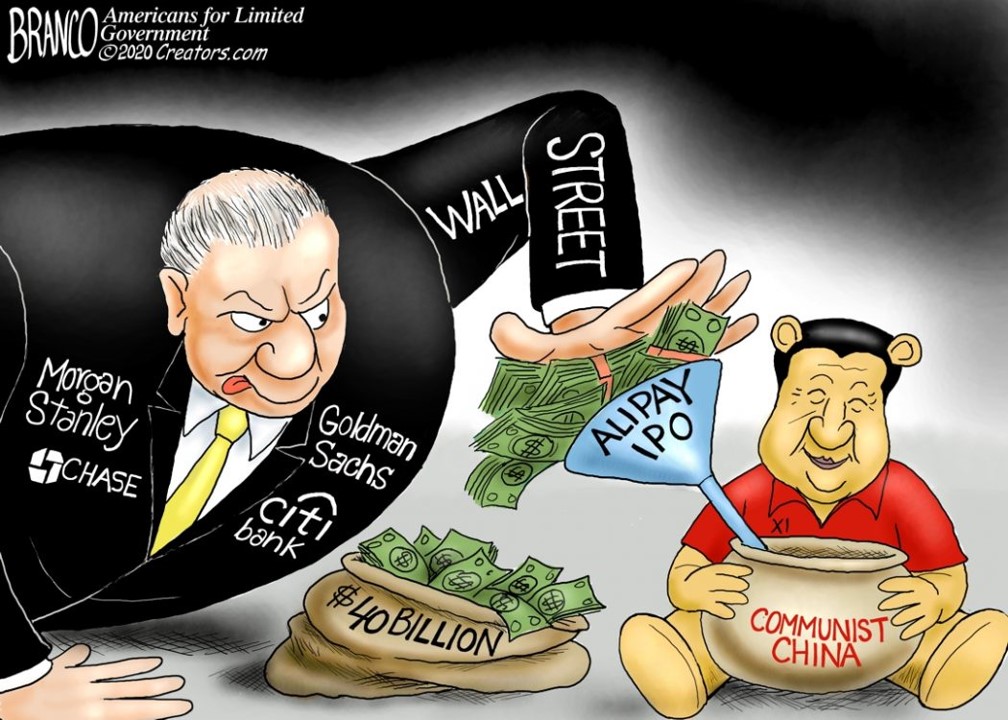
It shows what a complex world we live in within our financial markets. We debate whether companies should get involved in politics, but banks cannot avoid politics. Banks are integral to governments and economies and, as such, are a political tool. Equally, banks choose to operate in markets that could be positive or negative to their operations, based upon their politics.
For example, whenever I talk about Ant Group, Tencent, China and their technological prowess, I get some character saying don’t you care about the Uighur Muslims? Don’t you realise China is a dictatorship? Don’t you worry about China taking over the world? or something like that.
This is where progress and change have to separate from politics and society, a very hard thing to do. After all, the future is based upon political, economic, societal and technological change. All four factors are a key to change and one can change the world more than another. If a technology like the smartphone can take over the world, then the world’s political, economic and societal barriers breakdown. The same is true if a political change occurs, or an economic change or a societal change. Any of these four factors can change everything.
However, coming back to politics, no bank can escape these risks. An example is the Ant Group IPO. Listing in Hong Kong and Shanghai, it’s a Chinese firm that will be the world’s biggest IPO and many talk about the politics of China in their discussions of the company for that reason. And yet the companies that will probably make the most money from the Ant Group IPO are American.
Source: Winning the Pooh
China is obviously contentious. For example, take HSBC. HSBC were called out by me and others for their lack of position on China’s human rights policies, actions in Hong Kong and more. The bank is now in a lose-lose situation, as it either disappoints Beijing or Washington, as evidenced by this comment in The Financial Times last week:
HSBC faces an uncomfortable reality: the total market value of the group, known as HSBC Holdings, is lower than the tangible book value of The Hongkong and Shanghai Banking Corporation, HSBC’s founding entity, which now houses its Asian businesses. The market is in effect saying that HSBC is worthless outside Asia.
Sure, politics is integral to banking. But then why pick out China? India, America, everywhere has issues with their rights and freedoms.
Take Europe. Europe just launched the digital euro concept, and shared three tweets to highlight the idea and their outline report on the idea of a European Central Bank Digital Currency (CBDC).
(THREAD) As technological changes are transforming how we pay, a digital euro could offer a universally accepted, risk-free and trusted means of payment to complement cash. We’ve analysed its possible benefits and challenges in our report https://t.co/RiwOCers68 1/3 pic.twitter.com/FLv1eRAkBL
— European Central Bank (@ecb) October 2, 2020
The report is worth a read. For example:
A digital euro could support the Eurosystem’s objectives by providing citizens with access to a safe form of money in the fast-changing digital world. This would support Europe’s drive towards continued innovation. It would also contribute to its strategic autonomy by providing an alternative to foreign payment providers for fast and efficient payments in Europe and beyond. A digital euro may even become essential in a number of possible scenarios. For example, if the use of cash were to decline significantly, other electronic payment methods were to become unavailable owing to extreme events, or foreign digital money were to largely displace existing means of payment.
But then, if you check the comments in the thread alongside this tweet, there are a huge number of libertarians saying that this is awful.
This is a disgrace. Now that you are realizing that you have lost control over your debt fuelled monetary System your are taking the next step to control spanding patterns of Citizens even more. Your actions are useless, you cannot create deflation or inflation and you know it. pic.twitter.com/lAwDfFrgMY
— Renatowhoareyou (@renatowhoareyou) October 2, 2020
Opt out of the Euro my fellow Europeans and buy #Bitcoin
— HODL4LIFE.Hodl 🚀 (@D40five) October 2, 2020
This account has 582k followers.
The only comments I see are from the #bitcoin Community who challenge this Keynsian economic nonsense.
Where everyone else? pic.twitter.com/s5jCzvFMIR
— Daniel Prince.hodl ⛓️🌽🔴x4🚀🌕 (@princey1976) October 2, 2020
Only bitcoiners follow the ecb. Check the comments 😂😂
— Ben (@BenLeitmanis) October 2, 2020
In fact, it is surprising, amusing, interesting that the comments about the ECB’s ideas on an EU CBDC are mostly receiving commentary from libertarians who hate the idea … or is it?
The fact is that the establishment, the statists (other than me), the formal world are oblivious to the change in the world by technology. The reason the libertarian crypto community of bitcoinisters are most actively debated the digital euro on twitter is that they get the idea of the internet. It amazes me that even today, most of the establishment does not.
For example, when I present at a FinTech or Crypto conference – virtual or physical – there’s a flurry of twitter activity. When I present at a banking or economics conference, tumbleweed.
My concluding thought here is that banking cannot avoid politics and economics as the system is integral to both. However, banking must avoid being embroiled in political bias, which is why most central banks are not run by or part of national governments. The Bank of England si not part of UK Government. It is a separate entity and has been for a long time*:
Throughout our history, we have always seen ourselves as a public institution, acting in the national interest. Although the Bank was privately owned for a long time , our activities were determined by the Government and legislation.
In a similar way to the Bank of England, the Federal Reserve is a company in its own right. However, and this is the big caveat, most central banks end up reporting to and being accountable to their respective government treasury departments and controls.
Nevertheless, we are living in interesting times where companies are trying to avoid political statements and the financial systems are embroiled in the centre of those debates and frictions.
Hard to avoid.
Therefore, just to conclude, I see faults in every political system. I see no one getting it right. Every country of every nation is going through turmoil and change. This is why I don’t make any judgements on who is right or wrong, as every nation is getting it a little bit right and a little bit wrong.
The only thing I truly find abominable is human rights abuses which yes, does include the Muslims in China but also the African-American community in the USA.
He that is without sin among you, let him first cast a stone.
* POSTNOTE:
Due to the huge debts of World War II, The Bank of England was nationalised from 1946-1977
Chris M Skinner
Chris Skinner is best known as an independent commentator on the financial markets through his blog, TheFinanser.com, as author of the bestselling book Digital Bank, and Chair of the European networking forum the Financial Services Club. He has been voted one of the most influential people in banking by The Financial Brand (as well as one of the best blogs), a FinTech Titan (Next Bank), one of the Fintech Leaders you need to follow (City AM, Deluxe and Jax Finance), as well as one of the Top 40 most influential people in financial technology by the Wall Street Journal's Financial News. To learn more click here...


